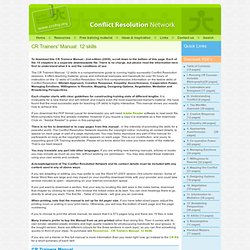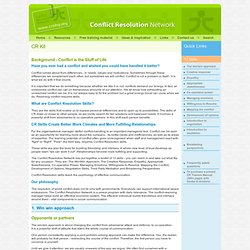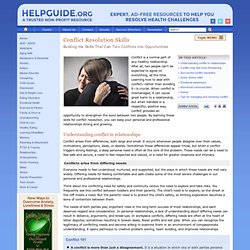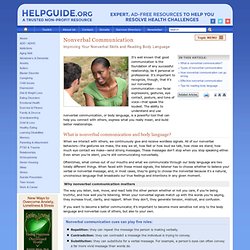

Conflict Resolution Network. To download this CR Trainers Manual - 2nd edition (2008), scroll down to the bottom of this page.

Each of the 19 chapters is a separate downloadable file. There is no charge, but please read the information here first to understand what it is and the conditions of use. The CR Trainers Manual: 12 skills is a comprehensive guide to running highly successful Conflict Resolution sessions. It offers teaching material, group and individual exercises and handouts for over 50 hours of instruction on the 12 skills of Conflict Resolution.You'll find comprehensive information on the twelve skills of Conflict Resolution: Win/win Approach, Creative Response, Empathy, Assertiveness, Cooperative Power, Managing Emotions, Willingness to Resolve, Mapping, Designing Options, Negotiation, Mediation and Broadening Perspectives. Each chapter starts with clear guidelines for constructing training slots of different lengths. You may translate any part into other languages. Introduction: Conflict Resolution Network.
Background - Conflict is the Stuff of Life Have you ever had a conflict and wished you could have handled it better?

Conflict comes about from differences - in needs, values and motivations. Sometimes through these differences we complement each other, but sometimes we will conflict. Conflict is not a problem in itself - it is what we do with it that counts. It is important that we do something because whether we like it or not, conflicts demand our energy. What are Conflict Resolution Skills? They are the skills that enable us to bypass personal differences and to open up to possibilities. CR Skills Create Better Work Climates and More Fulfilling Relationships For the organisational manager, skilful conflict-handling is an important managerial tool. These skills are also the tools for building friendship and intimacy.
The Conflict Resolution Network has put together a toolkit of 12 skills - you can reach in and take out what fits for any occasion. Our philosophy 1. Opponents or partners 2. Conflict Resolution Skills: Managing & Resolving Conflict in a Positive Way. Understanding conflict in relationships Conflict arises from differences, both large and small.

It occurs whenever people disagree over their values, motivations, perceptions, ideas, or desires. Sometimes these differences appear trivial, but when a conflict triggers strong feelings, a deep personal need is often at the core of the problem. These needs can be a need to feel safe and secure, a need to feel respected and valued, or a need for greater closeness and intimacy. Conflicts arise from differing needs Everyone needs to feel understood, nurtured, and supported, but the ways in which these needs are met vary widely.
Think about the conflicting need for safety and continuity versus the need to explore and take risks. The needs of both parties play important roles in the long-term success of most relationships, and each deserves respect and consideration. Conflict 101 A conflict is more than just a disagreement. Conflict may feel more threatening to you than it really is Close. Nonverbal Communication Skills: The Power of Body Language. What is nonverbal communication and body language?

When we interact with others, we continuously give and receive wordless signals. All of our nonverbal behaviors—the gestures we make, the way we sit, how fast or how loud we talk, how close we stand, how much eye contact we make—send strong messages. These messages don't stop when you stop speaking either. Even when you're silent, you're still communicating nonverbally. Oftentimes, what comes out of our mouths and what we communicate through our body language are two totally different things. Why nonverbal communication matters The way you listen, look, move, and react tells the other person whether or not you care, if you’re being truthful, and how well you’re listening. If you want to become a better communicator, it’s important to become more sensitive not only to the body language and nonverbal cues of others, but also to your own. Nonverbal communication cues can play five roles: Types of nonverbal communication and body language Touch.